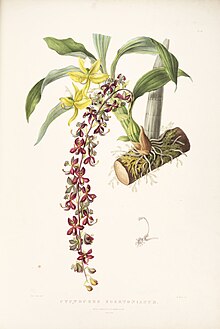
James Bateman (18 July 1811 – 27 November 1897) was a British landowner and accomplished horticulturist. He developed Biddulph Grange after moving there around 1840, from nearby Knypersley Hall in Staffordshire, England. He created the famous gardens at Biddulph with the aid of his wife Maria and his friend and painter of seascapes Edward William Cooke. From 1865–70 he was the founding president of the North Staffordshire Field Club, the large local organisation which researched local natural history and folklore.
Biography


He was born at Redvales near Bury in Lancashire, he matriculated with Lincoln College, Oxford, in 1829, graduating from Magdalen College with a BA in 1834 and an MA in 1845. Over the twenty years he made a great deal of money in iron, engineering and banking. In 1871, Bateman and his notable sons (who included the painter Robert Bateman) gave up the house and gardens at Biddulph, and he moved to Kensington in London. He later moved to Worthing in Sussex, where he died on 27 November 1897.
Collector of plants
"MA Magdalen College, Oxford, 1845, took great interest in collecting and cultivating tropical plants; FLS, 1833; FRS, 1838; fellow of Royal Horticultural Society; published writings on orchids and other horticultural subjects."
He was a collector of and scholar on orchids, President of the North Staffordshire Field Society, and served on the Royal Horticultural Society's Plant Exploration Committee. He especially loved rhododendrons and azaleas. He had a number of notable sons who grew up at Biddulph Grange, including the painter Robert Bateman.
Bateman was "a collector and scholar on orchids," and "was one of the early developers of orchid culture. He sponsored expeditions to Mexico and South America enabling collectors to gather rare specimens. He published three lavish books about orchids. He pioneered "cool orchid cultivation" which enabled the Odontoglossum to be cultivated in England, replicating the cool arid climate of the cloud forests in Central America where these exotic flowers are found. Walter Hood Fitch, (1817–1892)...was employed by Bateman to create the paintings for his magnificent orchid books...exceedingly rare, A Monograph of Odontoglossum, is composed of thirty large scale hand-coloured lithographs." The naturalist, Charles Darwin "received a box of orchids from Bateman on 25 January 1862 (and) a letter from him dated 28 January 1862."
Garden designer
He created the famous gardens at Biddulph with the aid of his botanist wife Maria and his friend and painter of seascapes Edward William Cooke. His gardens at Biddulph are a rare survival of the interim period between Capability Brown landscape garden and the High Victorian style. The gardens are compartmentalised and divided into themes.
Bateman "was also responsible for laying out the Arboretum at Derby, the first public park in England."
The children's book by Priscilla Masters, Mr Bateman's Garden (1987), is a fantasy set in the gardens.
Family
On 24 April 1838, he married Maria Sybilla, third daughter of Rowland Egerton Warburton and sister of Peter Egerton Warburton; they had three sons, John, Rowland, and Robert (a notable painter), and a daughter, Katherine, who married Ulrick Ralph Burke.
Publications
- The Orchidaceae of Mexico and Guatemala by James Bateman, c.1845 "Only 125 copies of this book were published. It is physically one of the largest botanical books ever published."
- A Second Century of Orchidaceous Plants, by James Bateman, London: L. Reeve & Co., 1867. "Large-4to (315 x 245 mm). pp. viii, with 100 beautifully handcoloured lithographed plates and descriptive text."
- A monograph of Odontoglossum by James Bateman, London: L. Reeve & Co., 1874. Facsimile of the title page
See also
The standard author abbreviation Bateman is used to indicate this person as the author when citing a botanical name.References
- Lankester Botanical Garden (2010). "Biographies" (PDF). Lankesteriana. 10 (2/3): 183–206, page 183. Archived (PDF) from the original on 23 May 2014.
- ^ Carlyle 1901.
- Concise Dictionary of National Biography, Oxford, 1995, p.169
- https://www.flickr.com/photos/castrovalva/301925626/ Biddulph Grange Tunnels
- original audubon prints,botanical prints,audubon paintings,audubon watercolors, Mark Catesby, botanical art Chicago, natural history, fine art, historical" Archived 7 August 2007 at the Wayback Machine
- Darwin Correspondence Project – Letter 3356 — Bateman, James to Darwin, C. R., [1862]. Archived 27 September 2007 at the Wayback Machine
- Horwood, Catherine (2010). Gardening Women: Their Stories From 1600 to the Present. United Kingdom: Hachette, UK. pp. 94–95. ISBN 978-0748118335.
- Musgrave, Toby; Calnan, Mike (2006). Seven deadly sins of gardening : and the vices and virtues of gardeners. London: National Trust. pp. 127–130. ISBN 978-1-905400-46-1. OCLC 70173987.
{{cite book}}: CS1 maint: date and year (link) - Biddulph photos, maps, books, memories – Francis Frith Archived 26 September 2007 at the Wayback Machine
- Staffordshire Past Track -Cattleya skinneri – Orchidaceae of Mexico and Guatemala Archived 28 September 2007 at the Wayback Machine
- Biodiversity Heritage Library: Information about 'A monograph of Odontoglossum by James Bateman.' Archived 27 September 2007 at the Wayback Machine
- MBG Rare Books: title page
- International Plant Names Index. Bateman.
- Attribution
![]() This article incorporates text from a publication now in the public domain: Carlyle, Edward Irving (1901). "Bateman, James". In Lee, Sidney (ed.). Dictionary of National Biography (1st supplement). London: Smith, Elder & Co.
This article incorporates text from a publication now in the public domain: Carlyle, Edward Irving (1901). "Bateman, James". In Lee, Sidney (ed.). Dictionary of National Biography (1st supplement). London: Smith, Elder & Co.
External links
- James Bateman's work on orchids
- View digitized titles by James Bateman in Botanicus.org
- James Bateman and Orchid Literature Archived 27 July 2011 at the Wayback Machine
- Picture of James Bateman Archived 7 October 2007 at the Wayback Machine
- Missouri Botanical Garden – A monograph of Odontoglossum